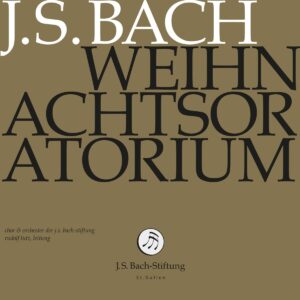I have listened to Bach’s Christmas Oratorio from childhood on. Every season, always the same tape–until it wore out. That’s the reason Karl Richter’s (second) recording remains my emotional reference to this day. Readers might have their own such reference. But while Richter is still my feel-good choice (with that innate sense of musicality and Fritz Wunderlich’s Evangelist!), time moves on and there have been some great recordings since. Add this one to the list!
And let’s be honest. The dragging, slipping and sliding violins, approximately in tune, the sluggish choirs, and the lugubrious forward-pounding of the whole music–even of recordings that were well ahead of their time and musically infused (say: Karl Münchinger)–don’t hold up as acceptable to our spoiled-rotten ears, more than half a century later. We need Christmas Oratorios for our time. And that’s what this recording is: a top-notch modern post-ideological HIP performance without vocal weaknesses, excellently performed to current taste, musical, and in very good sound. It has everything to be a reference recording of today. While swift and offering plenty of clarity, it’s also not too skinny-sounding a recording, which would be misplaced in such a trumpet- and timpani-laden musical celebration.
Rudolf Lutz’s singers meanwhile, are actually much more than “without weakness”. They are a considerable point of strength. It starts in the opening aria “Es begab sich aber zu der Zeit” with dulcet Daniel Johannsen, who is refined sweetness manifest and proves, in what might be his most impressive performance yet (among many very fine ones), that he is the Evangelist of his generation. When the alto chimes in with the recitative “Nun wird mein liebster Bräutigam” I listened up: Haven’t I heard this magnificent voice before? Recently? Yes–it is Elvira Bill, who has been the highlight of the last two Christmas Oratorios I have reviewed this season (Thomaner Chorus / G. Schwarz / Accentus and the Hymnus Choirboys / R.J. Homburg / MDG). She shows up for Lutz just the same.
Because the six cantatas are live recordings (you’d never know from the sound, and there are zero audience intrusions), performed on different dates over two years, the cast changes (except for the narrating fix-point Johannsen). That means we get Bill only in the first cantata, where she makes it count. Rather than resulting in a lack of vocal continuity, this switching-up of contributing voices becomes a luxurious wealth of timbral variety. It helps, of course, that those other singers are no slouches, among them the top-notch, ever-natural-sounding countertenor/alto Terry Wey.
Let the chorus “Ehre sei Gott in der Höhe” (Part II) serve as an example of the continuous pulse that Lutz attains, thus avoiding sounding rushed despite often swift tempos (something Chailly/Decca and Jacobs/Harmonia Mundi don’t always manage). I still like the extraordinary contrast in tempo that Richter throws in for the interjection “…und Friede auf Erden”, which gets a little ironed over by Lutz (as it does by most other modern readings), and Rademann’s Gaechinger Cantorey (Hänssler) has a more nuanced, smoother attack. But direct comparison elsewhere confirms more strengths than it exposes potential weaknesses. Just the thing for the season and many coming ones.
































